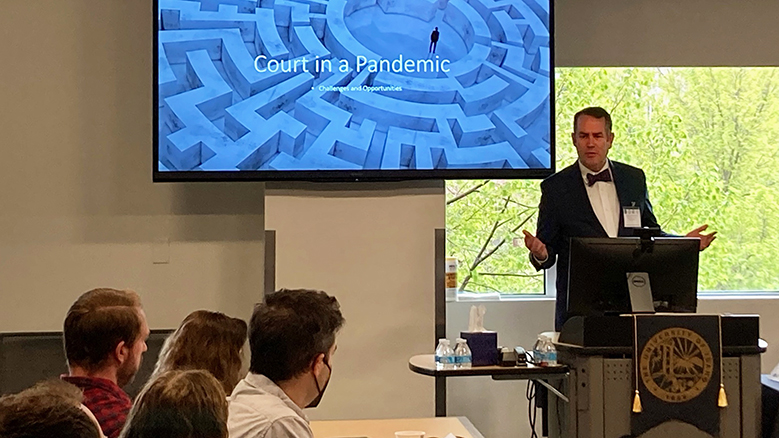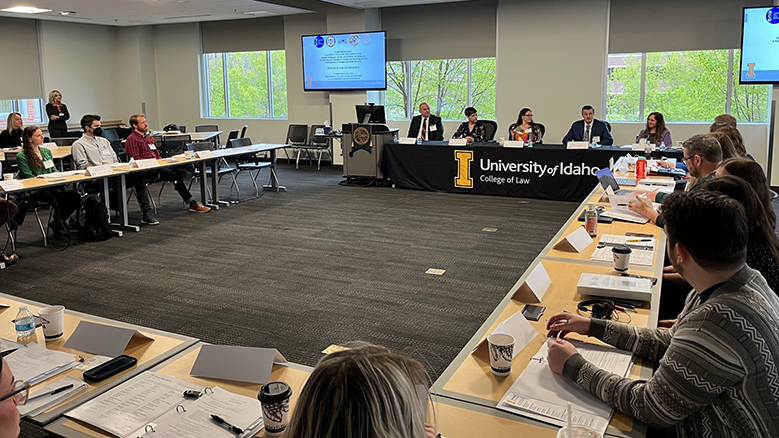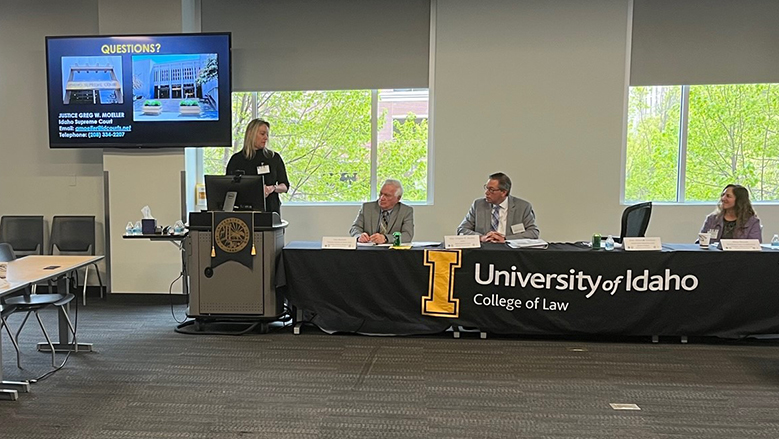
|
Demystifying the Courts: Idaho Journalists Institute Promotes Understanding of the Courts and the JudiciaryJune 17, 2022
Federal judges and staff from the District of Idaho participated in Idaho’s third Journalists’ Institute on Covering the Courts in April. The Idaho Press Club, Attorneys for Civic Education and the University of Idaho College of Law teamed up to hold the institute. Previous institutes were held in 2018 and 2019. Twenty-eight journalists from across Idaho attended this year’s gathering in Boise to hear presentations from judges from the United States District Court for the District of Idaho and the Idaho State Supreme Court, and faculty from the University of Idaho College of Law. The day-long program, titled “Without Fear or Favor: Reporting on the Rule of Law and the Work of an Independent, Impartial Judiciary,” included information on journalists’ access to court proceedings, a discussion on prosecutorial discretion and the role and importance of jury instructions. Idaho journalists who cover the courts, or who supervise reporters who cover them, were all invited. “The Institute this year again focused on journalists’ vital role in civic education and emphasized the importance of an independent, impartial judiciary,” said Katie Ball, associate professor at the UI College of Law. “Presentations and the workshop session helped illustrate how to consider the rule of law when reporting on court decisions. We appreciate the federal court providing funding for the program and the contributions from Steve Kenyon, (Clerk for the U.S. District of Idaho) who helped plan the program and organized panel discussions, and Judges Debora Grasham (Magistrate Judge, U.S. District Court, District of Idaho) and Raymond Patricco, (Chief Magistrate Judge, U.S. District Court, District of Idaho) who … presented at the program.” Don Burnett, professor emeritus of law at UI, “was again a moving force behind this year’s program,” said Ball. Burnett spoke on a topic close to his heart, the role of an independent, impartial judiciary in America’s constitutional republic. In his updated 2014 essay on the subject, he notes the value of the media in educating the public on the justice system: “News stories – whether in print or electronic form – profoundly shape public perceptions of the justice system. Journalists have long shared in spirit the judiciary’s goals of independence and impartiality,” his essay notes, the updated version specifically lauding the Idaho institutes’ emphasis on the rule of law and upon the importance of an independent, impartial judiciary. Agenda topics included how journalists can access court operations proceedings and court records, media coverage of judicial decisions, perspectives on prosecutorial discretion, and jury instructions and media-court relations.
“Reporting on legal matters is vitally important,” Judge Patricco, who spoke during opening remarks, noted. “Journalists provide transparency regarding the legal process, and transparency is the key to the legitimacy of the legal process. It is what separates our legal system from that of other countries and what makes our system the most fair and highly-functioning in the world. But that reporting must be accurate for the goals of transparency and legitimacy to be achieved and accuracy requires access. On this score, our clerk of court, Steve Kenyon, and the other federal judges in Idaho, are committed to providing journalists with the access needed to do their job well.” Judge Patricco said the journalist institutes help the courts by opening dialogue between judges, lawyers and journalists. “They help bridge the ‘legalese and procedure gap,’ he said. “Judges and lawyers try to explain legal concepts in plain English so that journalists can better understand how the courts operate and report accurately. Accurate reporting is the goal for which we all strive. For the judges, the institutes are a reminder of the importance of the openness of the proceedings, and how that openness fosters legitimacy of the legal system.”
Prior to her confirmation as a magistrate judge in 2022, Judge Grasham was a long-time Idaho Press Club board member and planner for the previous institutes, and a former member of the Ninth Circuit’s Public Information and Community Outreach Committee. She noted the value of interacting with court officers. “I know the journalists who did attend commented they really appreciated the ‘up close and personal’ time with the judges – an opportunity they rarely get,” she said. “These kinds of interactions help demystify the courts, judges and our processes, and eventually lead to a better understanding of what we all do.” This was the first institute Judge Grasham participated in. “I was on the panel addressing the challenges that judges and journalists face in communicating the rule of law content of judicial decisions,” she said. “I thought it was an important topic and one which was of great interest to the participants. We provided several examples of judicial decisions and how they were inaccurately reported – oftentimes by something as simple as a misleading headline. We discussed how this happens, what impact the misleading headline could have, and ways to avoid the same mistakes in the future. It was a very cooperative, hands-on session. Overall, I continue to be impressed with our court’s commitment to transparency and working with journalists to understand the important work of our courts.” |
||||




